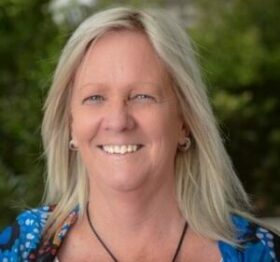

“One of the things I love about my role is guiding my patients (if they wish) along their journey to spirit. As I have a connection to Spirit and our Spiritual Ancestors, I can help to guide them, so they feel safe and supported leading up to and when they transition.”
I am a proud Gamilaraay woman from Coonabarabran and was mainly raised on Dharawal land. I enjoy running in the bush and doing Aboriginal artwork. I often go on Country to connect to my spiritual ancestors. The connection with country and my Spirits, helps me refuel for my work.
I started working as the Aboriginal Health Worker for Paediatric Palliative Care and Chronic and Complex Needs at the Sydney Children’s Hospital Network (SCHN) in 2019. How I came to be here evolved over time. My daughter is a childhood cancer survivor, during her illness journey we made many hospital friends and very sadly, quite a few of these friends lost their battle and went to spirit. From this time, I felt it was important for myself and my daughter to honour these children in some way. During the years that followed I worked with disadvantaged youth and worked very closely with two of my cultural mentors. This role and these relationships led me to connect with an Aboriginal Employment Advisor at SCHN who encouraged me to apply for this position in Paediatric Palliative Care.
The purpose of this position is to provide cultural support to Aboriginal children with life limiting conditions and their families. Building rapport with all families is extremely important to me and very strong in our community. It is very natural amongst Mob to be there for each other and provide support. What I do differs from family to family. I build rapport with a child to develop a connection, support a family at medical meetings/appointments, be present with a family for a difficult conversation, advocate for children and family needs or support a child who is away from Country who may have only one family member with them. I also help to educate staff on past traumas the family may have experienced, often there is intergenerational trauma.
One of my main roles is to culturally support patients and families during end-of-life stages, working closely with the rest of the multidisciplinary team. What I do during this time again varies greatly from family to family and I work with each family to support their individual needs. I can help with Sorry Business following the death of a patient (if they would like) and this may include organising a Cultural Ceremony through an Elder, carrying out a Cultural Ceremony myself or helping to facilitate where the family would like their child to be laid to rest. Sorry Business for Aboriginal people starts from when the patient is diagnosed or becomes unwell and continues during the illness, death and afterwards.
One of the things I love about my role is guiding my patients (if they wish) along their journey to spirit. As I have a connection to Spirit and our Spiritual Ancestors, I can help to guide them, so they feel safe and supported leading up to and when they transition.
Select where you would like to share this article
Close WindowWe recognise and acknowledge those who are working through Sorry Business, Sad News, grief and bereavement and offer our condolences and support.
Aboriginal and Torres Strait Islander peoples are advised that this website may contain images, videos and voices of people who have passed on. Some of the content and topics covered might also cause distress. You are welcome here, and we want you to feel safe and take care.
If you find that you need support please reach out to 13YARN on 13 92 76, Grief Australia, Grief Line on 1300 845 745, or Lifeline on 13 11 14.
Palliative Care Australia is located in Canberra. We acknowledge the traditional custodians of the surrounding land and waters, the Ngunnawal and Ngambri Peoples and pay our respects to Elders past and present. We extend that same respect and acknowledge the continuing cultures and contribution of Aboriginal and Torres Strait Islander Peoples across Australia.
Close